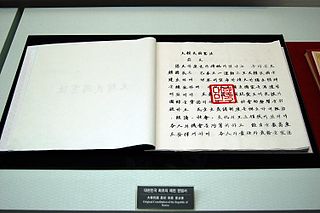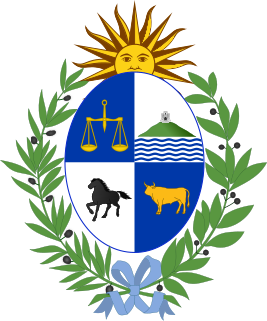
The Seventeenth Amendment to the United States Constitution established the direct election of United States senators in each state. The amendment supersedes Article I, §3, Clauses 1 and 2 of the Constitution, under which senators were elected by state legislatures. It also alters the procedure for filling vacancies in the Senate, allowing for state legislatures to permit their governors to make temporary appointments until a special election can be held.
A constitutional amendment is a modification of the constitution of a polity, organization or other type of entity. Amendments are often interwoven into the relevant sections of an existing constitution, directly altering the text. Conversely, they can be appended to the constitution as supplemental additions, thus changing the frame of government without altering the existing text of the document.

A constituent assembly is a body assembled for the purpose of drafting or revising a constitution. Members of a constituent assembly may be elected by popular vote, drawn by sortition, appointed, or some combination of these methods. Assemblies are typically considered distinct from a regular legislature, although members of the legislature may compose a significant number of its members. As the fundamental document constituting a state, a constitution cannot normally be modified or amended by the state's normal legislative procedures; instead a constitutional convention or a constituent assembly, the rules for which are normally laid down in the constitution, must be set up. A constituent assembly is usually set up for its specific purpose, which it carries out in a relatively short time, after which the assembly is dissolved. A constituent assembly is a form of representative democracy.

The Spanish Constitution is the democratic law that is supreme in the Kingdom of Spain. It was enacted after its approval in a constitutional referendum, and it is the culmination of the Spanish transition to democracy. The Constitution of 1978 is one of about a dozen of other historical Spanish constitutions and constitution-like documents; however, it is one of two fully democratic constitutions. It was sanctioned by King Juan Carlos I on 27 December, and published in the Boletín Oficial del Estado on 29 December, the date in which it became effective. The promulgation of the constitution marked the culmination of the Spanish transition to democracy after the death of general Francisco Franco, on 20 November 1975, who ruled over Spain as a military dictator for nearly 40 years. This led to the country undergoing a series of political, social and historical changes that transformed the Francoist regime into a democratic state.
The Victoria Charter was a set of proposed amendments to the Constitution of Canada in 1971. This document represented a failed attempt on the part of Prime Minister Pierre Trudeau to patriate the Constitution, add a bill of rights to it and entrench English and French as Canada's official languages; he later succeeded in all these objectives in 1982 with the enactment of the Constitution Act, 1982.

The Constitution of South Africa is the supreme law of the Republic of South Africa. It provides the legal foundation for the existence of the republic, it sets out the rights and duties of its citizens, and defines the structure of the Government. The current constitution, the country's fifth, was drawn up by the Parliament elected in 1994 in the South African general election, 1994. It was promulgated by President Nelson Mandela on 18 December 1996 and came into effect on 4 February 1997, replacing the Interim Constitution of 1993. The first constitution was enacted by the South Africa Act 1909, the longest-lasting to date. Since 1961, the constitutions have promulgated a republican form of government.

The Constitution of the Russian Federation was adopted by national referendum on 12 December 1993. Russia's constitution came into force on 25 December 1993, at the moment of its official publication, and abolished the Soviet system of government. The current Constitution is the second most long-lived in the history of Russia, behind the Constitution of 1936.
A supermajority, supra-majority, qualified majority, or special majority is a requirement for a proposal to gain a specified level of support which is greater than the threshold of more than one-half used for a simple majority. Supermajority rules in a democracy can help to prevent a majority from eroding fundamental rights of a minority. Changes to constitutions, especially those with entrenched clauses, commonly require supermajority support in a legislature. Parliamentary procedure requires that any action of a deliberative assembly that may alter the rights of a minority have a supermajority requirement, such as a two-thirds vote.

Proposition 59 was an amendment of the Constitution of California that introduced freedom of information or "sunshine" provisions. It was proposed by the California Legislature and overwhelmingly approved by the voters in an initiative held as part of the November 2004 elections.

The Constitution of the Bolivarian Republic of Venezuela is the current and twenty-sixth constitution of Venezuela. It was drafted in mid-1999 by a constituent assembly that had been created by popular referendum. Adopted in December 1999, it replaced the 1961 Constitution, the longest-serving in Venezuelan history. It was primarily promoted by then President of Venezuela Hugo Chávez and thereafter received strong backing from diverse sectors, including figures involved in promulgating the 1961 constitution such as Luis Miquilena and Carlos Andrés Pérez. Chávez and his followers (chavistas) refer to the 1999 document as the "Constitución Bolivariana" because they assert that it is ideologically descended from the thinking and political philosophy of Simón Bolívar and Bolivarianism. Since the creation of the Constituent National Assembly in August 2017, the Bolivarian government has declared the 1999 constitution suspended until a new constitution is created.

The Constitution of the Republic of Singapore is the supreme law of Singapore. A written constitution, the text which took effect on 9 August 1965 is derived from the Constitution of the State of Singapore 1963, provisions of the Federal Constitution of Malaysia made applicable to Singapore by the Republic of Singapore Independence Act 1965, and the Republic of Singapore Independence Act itself. The text of the Constitution is one of the legally binding sources of constitutional law in Singapore, the others being judicial interpretations of the Constitution, and certain other statutes. Non-binding sources are influences on constitutional law such as soft law, constitutional conventions, and public international law.

The Constitution of the Republic of Korea is the supreme law of South Korea. It was promulgated on July 17, 1948 and last revised on October 29, 1987.

A convention, in the sense of a meeting, is a gathering of individuals who meet at an arranged place and time in order to discuss or engage in some common interest. The most common conventions are based upon industry, profession, and fandom. Trade conventions typically focus on a particular industry or industry segment, and feature keynote speakers, vendor displays, and other information and activities of interest to the event organizers and attendees. Professional conventions focus on issues of concern along with advancements related to the profession. Such conventions are generally organized by societies or communities dedicated to promotion of the topic of interest. Fan conventions usually feature displays, shows, and sales based on pop culture and guest celebrities. Science fiction conventions traditionally partake of the nature of both professional conventions and fan conventions, with the balance varying from one to another. Conventions also exist for various hobbies, such as gaming or model railroads.

The Secretary of State of Wisconsin is a constitutional officer in the executive branch of the government of the U.S. state of Wisconsin, and is second in the line of succession to the office of Governor of Wisconsin. Twenty-eight individuals have held the office of Secretary of State, two of whom have held non-consecutive terms. The incumbent is Doug La Follette, a Democrat first elected for a single four-year term in 1974 and reelected since 1982.

The Government of Georgia is the supreme body of executive power in Georgia that implements the domestic and foreign policies of the country. It consists of Prime Minister—the head of the government—and ministers and is accountable and responsible to the Parliament of Georgia. The current powers and responsibilities of the Government are governed by the amendments of the Constitution of Georgia passed in 2017 and 2018. From 14 May 1991 to 9 November 1996, the executive government of Georgia was referred to as the Cabinet of Ministers of the Republic of Georgia.
Municipal or local governance refers to the third tier of governance in India, at the level of the municipality or urban local body.

The right to vote in Singapore is not explicitly stated in Singapore's Constitution, but the Government has expressed the view that it may be inferred from the fact that Singapore is a representative democracy and from specific constitutional provisions, including Articles 65 and 66 which set out requirements for the prorogation and dissolution of Parliament and the holding of general elections. Speaking on the matter in Parliament in 2009, the Minister for Law, K. Shanmugam, said that the right to vote could not be a mere privilege as this would imply the existence of an institution superior to the body of citizens that is empowered to grant such a privilege, but that no such institution exists in a free country. In 1966 a Constitutional Commission chaired by Chief Justice Wee Chong Jin advocated entrenching the right to vote within the Constitution, but this was not taken up by the Parliament of the day. When this proposal was repeated during the 2009 parliamentary debate, the Government took the view that such entrenchment was unnecessary.

The politics of France take place with the framework of a semi-presidential system determined by the French Constitution of the French Fifth Republic. The nation declares itself to be an "indivisible, secular, democratic, and social Republic". The constitution provides for a separation of powers and proclaims France's "attachment to the Rights of Man and the principles of national sovereignty as defined by the Declaration of 1789."

A constitutional referendum was held in Uruguay on 30 November 1980. Although the new constitution drafted by the military regime was rejected by voters, some of its proposals were implemented anyway.
In India, a Constitutional body is a body or institute established by the Constitution of India. They can only be created or changed by passing a constitutional amendment bill, rather than an Act of Parliament.